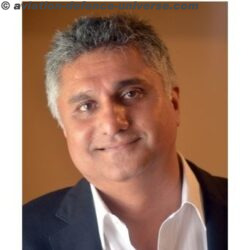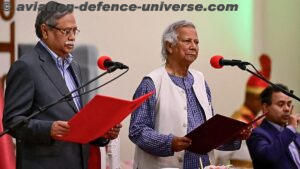New Delhi. 09 December 2018. Pakistan which is facing diplomatic isolation in world arena wants to show to the world community that it wants to have peace with India. The powerful Pakistan military, which consumes about 60 percent of Pakistan’s scarce resources, is also pressing hard to the civilian prime minister to initiate peaceful negotiations with India. Imran Khan after winning elections also stated that Pakistan wants to have friendly relations with India. He stated that “I really want to fix our ties, you take one step forward, we will take two.”
Few days back also he reiterated to start negotiations and also invited Indian Prime Minister to attend South Asian Association for Regional Cooperation (SAARC) summit. Khan also made it clear that civilian government as well as army is “on one page” and wants to recommence dialogue with India. Pakistan Foreign Office also requested Indian Minister of External Affairs Sushma Swaraj to attend the opening of Kartarpur corridor. However instead of Minister of External Affairs, two Sikh Ministers namely Harsimrat Kaur Badal and Hardeep Singh Puri attended the groundbreaking ceremony.
The economic condition of Pakistan is deteriorating and it is making efforts to have bailout package from International Monetary Fund (IMF). However IMF has put stringent stipulations including the details of Chinese loan, its repayment and terms and conditions of China Pakistan Economic Corridor (CPEC).
United States (US) which always rescued Pakistan directly or through IMF is also reluctant, as President Trump is continuously issuing hard-hitting statements. US has put strident cut-offs on economic and military assistance and Trump made it clear that although US gave billions of dollars to Pakistan but it has done nothing to curb terrorism. Although Trump wrote a letter to Pakistan Prime Minister to help in negotiations with Afghan Taliban but it appears that in near future US will not extend financial assistance to Islamabad.
China, which is an all weather friend, had also showed its inability to render financial assistance, although Imran Khan went to China with great hopes. Pakistan Tehreek-e-Insaf (PTI) propagated in the country, that Khan will bring assistance of about six billion dollars from China. Although 16 agreements were signed during the visit of Pakistani prime minister but China clarified that at present no financial assistance will be given as both countries need to negotiate more. Not only this recently CGTN Television which is a government run TV channel has detached Pakistan Occupied Kashmir (POK) from the map of Pakistan. Indian and Chinese defence forces would be conducting joint military exercise on December 10.
China is also worried about the security of several hundreds of Chinese working in Karachi and restive province of Balochistan in connection of diverse projects especially CPEC. On 23rd November three heavily armed terrorists of Baluchistan Liberation Army (BLA) attacked Chinese consulate in Karachi, in which seven persons including assailants were killed. In past also there were attacks on Chinese personnel; a high-ranking Chinese shipping executive was killed in Karachi in February 2018.
Iran being a Shia dominated country, views Pakistan with suspicion as the latter receives heavy financial assistance from Saudi Arabia and it has about 80 percent Sunni population. There are several Sunni terrorist organisations namely Lashkar-e-Jhangvi, Tehrik-i-Taliban Pakistan, Ahle-e-Sunnat-Wal-Jammat, Sipah-e-Sahaba Pakistan, Jundallah etc and these organisations claim that Shias are pretend Muslims and they must be exterminated. These organisations made several terrorist attacks on Shia mosques and their congregations. These organisations were also involved in terrorist attacks inside Iran. On 6th December a suicide attack occurred at Port city of Chabahar in which two persons were killed, while 28 were injured. Chabahar Port has Indian interests and it is near Pakistan border where Sunni extremists oppose Shias. The Foreign ministry of Iran, without taking name of any country, claimed external hand in the terrorist attack.
Pakistani press is apprehensive about growing proximity between India and Saudi Arabia. Although Saudi Arabia promised $ 6 billion dollars assistance to Pakistan but Saudi authorities constant appreciation of India is disliked by Pakistan.
Islamabad has hostile relations with Kabul as it wants to install puppet regime in Afghanistan. The Inter Services Intelligence (ISI) has created several terrorist outfits including Hikmatyar group which constantly carries out terrorist activities in Afghanistan.
The Western countries also consider Pakistan as a country which helps terrorists all over the world hence the new regime in Pakistan wants to uplift the image of the country.
In view of above Imran Khan proposed negotiations with India. However he mentioned that the core issue between India and Pakistan is Kashmir and it should be resolved, knowing full well that there are intense differences between both the countries about Kashmir and it cannot be resolved easily.
Few Pakistan watchers claim General Qamar Javed Bajwa is genuinely worried about the precarious economic condition of the country and although in past he appreciated CPEC but now realising that it is a debt-trap and Pakistan will not able to repay the loan and China will forcibly capture arable land and mineral rich areas of Gilgit and Baltistan. General Bajwa is also concerned about increasing dependence of Pakistan on China and its isolation from other world powers especially USA.
However Sushma Swaraj made it clear that neither India will accept Pakistan’s proposal to attend SAARC Summit nor there will be any peace talks as terror and talks cannot go together. Swaraj also clarified that Kartarpur corridor is not connected with the dialogue between India and Pakistan. The remarks of Pakistan foreign minister Shah Mehmood Qureshi about opening of Kartarpur corridor as Imran Khan’s “googly” which compelled India to send two ministers also clarifies the sinister motive of opening of Kartarpur corridor.
The Pakistan military controlled ISI is also worried as insurgency in Kashmir is slowing down. The security forces have eliminated large number of terrorists in the valley under Operation All Out. Several caches of arms and ammunition were also unearthed under Operation Cordon and Search. ISI’s support agents were also caught or extinguished during these operations. The 8th phase out of nine phases of Panchayat elections were already held peacefully in the state while ninth phase would be held on December 11. The local population took active part in the elections and in 8th phase 79.9 percent polling was held. The morale and support of terrorists is declining and people are providing actionable intelligence to the security forces which is helping them in eliminating terrorists. Pakistan is also not able to infiltrate terrorists partly because of advent of winters but mainly because of stringent vigil of security forces.
As insurgency is dwindling in J&K, Pakistan wants to revive Khalistan issue and the analysts claim that ISI would try to use Kartarpur Corridor to inflame Punjab. Khalistan separatist leaders settled in Pakistan and abroad would try to radicalise the Sikh pilgrims who will visit the holy shrine. The presence of Gopal Singh Chawla the pro-Khalistani leader, who previously stopped Indian officials from visiting Lahore Gurudwara, exposes that Pakistan has hidden agenda. The presence of General Bajwa and flouting of protocol of visiting Indian ministers also indicate the uncanny schema of Islamabad.
There are intelligence reports that Zakir Rashid Bhat Musa former Hizbul Mujahideen Commander and successor of Burhan Wani was positioned by ISI in Punjab to revive Khalistan movement. Zakir Musa who studied in Chandigarh and well versed in Punjabi is also founder and chief of Al-Qaeda cell Ansar Ghazwat-ul-Hind. He stayed in Mohali from 2010 to 2015, wears turban to mislead security forces and the local populace. The security agencies got information about his presence in Punjab and Gurdaspur police has even pasted posters about Musa’s presence in the region. Musa escaped from the valley because of the immense pressure of security forces on the terrorists.
According to intelligence reports the accomplices of Zakir Musa threw a hand grenade at Nirankari Bhawan in Adiwal village in District Amritsar on 18th November, 2018. The grenade attack, which killed three persons and injured more than 20 people, was on a religious congregation indicates that it is with ulterior motive of generating animosity and hatred in Punjab. The security agencies arrested three persons including Yusuf Rafiq Bhatt a close relation of Zakir Musa. According to police sources, arms and ammunition were recovered from their possession and the arrested persons have links with Jaish-e-Mohammed (J-e-M).
In fact Pakistan’s offer of peaceful negotiations is a trap as it wants to show to the world that Pakistan is a peace-loving country and wants to start negotiations with its arch-rival India. Nonetheless it has enhanced ceasefire violations, cross-border firings, infiltration of terrorists and ruthless killings by Border Action Team (BAT). Imran Khan had also not mentioned anything about cross border terrorism, about giving punishment to Hafiz Muhammad Saeed a proclaimed offender, co-founder of Lashkar-e-Toiba (L-e-T), Chief of Jamaat-ud-Dawah (JuD) and mastermind of 2008 Mumbai attacks in which more than 164 civilians including 6 Americans were killed.
Hafiz Saeed and Zaki-ur-Rehman Lakhavi prominent leader of L-e-T are freely moving in Pakistan and addressing public meeting and instigating masses against India. Pakistan had also released twenty special stamps eulogising Kashmiri terrorists including Burhan Wani. Hence overtly Khan offered olive branch but covertly ISI will continue cross-border terrorism hence there is no use to resume the talks and it is good that Delhi has refused to accept the bait and mentioned emphatically that first Pakistan must stop the low intensity war and then talks can recommence.
(Jai Kumar Verma is a Delhi-based strategic analyst and member of United Services Institute of India and Institute for Defence Studies and Analyses. The views in the article are solely the author’s. He can be contacted at editor.adu@gmail.com)























































































































